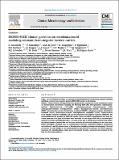Por favor, use este identificador para citar o enlazar a este item:
http://hdl.handle.net/10261/201710COMPARTIR / EXPORTAR:
 SHARE SHARE
 CORE
BASE CORE
BASE
|
|
| Visualizar otros formatos: MARC | Dublin Core | RDF | ORE | MODS | METS | DIDL | DATACITE | |

| Título: | ESCMID-EUCIC clinical guidelines on decolonization of multidrug-resistant Gram-negative bacteria carriers |
Autor: | Tacconelli, Evelina; Mazzaferri, F.; Smet, A. M. de; Bragantini, D.; Eggimann, P.; Huttner, B. D.; Kuijper, E. J.; Lucet, J. C.; Mutters, Nico T.; Sanguinetti, Maurizio; Schwaber, Mitchell J.; Souli, María; Torre-Cisneros, Julián; Price, J. R.; Rodríguez-Baño, Jesús CSIC ORCID | Palabras clave: | Acinetobacter Carbapenemases Decolonization Enterobacteriaceae Extended-spectrum β-lactamase Guidelines Multidrug-resistant Gram-negative Pseudomonas Stenotrophomonas |
Fecha de publicación: | jul-2019 | Editor: | Elsevier | Citación: | Clinical Microbiology and Infection 25(7): 807-817 (2019) | Resumen: | [Scope] The aim of these guidelines is to provide recommendations for decolonizing regimens targeting multidrug-resistant Gram-negative bacteria (MDR-GNB) carriers in all settings. [Methods] These evidence-based guidelines were produced after a systematic review of published studies on decolonization interventions targeting the following MDR-GNB: third-generation cephalosporin-resistant Enterobacteriaceae (3GCephRE), carbapenem-resistant Enterobacteriaceae (CRE), aminoglycoside-resistant Enterobacteriaceae (AGRE), fluoroquinolone-resistant Enterobacteriaceae (FQRE), extremely drug-resistant Pseudomonas aeruginosa (XDRPA), carbapenem-resistant Acinetobacter baumannii (CRAB), cotrimoxazole-resistant Stenotrophomonas maltophilia (CRSM), colistin-resistant Gram-negative organisms (CoRGNB), and pan-drug-resistant Gram-negative organisms (PDRGNB). The recommendations are grouped by MDR-GNB species. Faecal microbiota transplantation has been discussed separately. Four types of outcomes were evaluated for each target MDR-GNB:(a) microbiological outcomes (carriage and eradication rates) at treatment end and at specific post-treatment time-points; (b) clinical outcomes (attributable and all-cause mortality and infection incidence) at the same time-points and length of hospital stay; (c) epidemiological outcomes (acquisition incidence, transmission and outbreaks); and (d) adverse events of decolonization (including resistance development). The level of evidence for and strength of each recommendation were defined according to the GRADE approach. Consensus of a multidisciplinary expert panel was reached through a nominal-group technique for the final list of recommendations. [Recommendations] The panel does not recommend routine decolonization of 3GCephRE and CRE carriers. Evidence is currently insufficient to provide recommendations for or against any intervention in patients colonized with AGRE, CoRGNB, CRAB, CRSM, FQRE, PDRGNB and XDRPA. On the basis of the limited evidence of increased risk of CRE infections in immunocompromised carriers, the panel suggests designing high-quality prospective clinical studies to assess the risk of CRE infections in immunocompromised patients. These trials should include monitoring of development of resistance to decolonizing agents during treatment using stool cultures and antimicrobial susceptibility results according to the EUCAST clinical breakpoints. |
Versión del editor: | https://doi.org/10.1016/j.cmi.2019.01.005 | URI: | http://hdl.handle.net/10261/201710 | DOI: | 10.1016/j.cmi.2019.01.005 | ISSN: | 1198-743X | E-ISSN: | 1469-0691 |
| Aparece en las colecciones: | (IBIS) Artículos |
Ficheros en este ítem:
| Fichero | Descripción | Tamaño | Formato | |
|---|---|---|---|---|
| 1-s2.0-S1198743X19300254-main.pdf | 427,93 kB | Adobe PDF |  Visualizar/Abrir |
CORE Recommender
SCOPUSTM
Citations
110
checked on 13-abr-2024
WEB OF SCIENCETM
Citations
96
checked on 22-feb-2024
Page view(s)
190
checked on 19-abr-2024
Download(s)
191
checked on 19-abr-2024
Google ScholarTM
Check
Altmetric
Altmetric
Este item está licenciado bajo una Licencia Creative Commons

